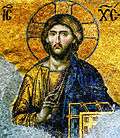Epistle to Diognetus
| Part of a series on |
| Eastern Christianity |
|---|
 |
|
Liturgy and worship |
|
The Epistle of Mathetes to Diognetus (Greek: Πρὸς Διόγνητον Ἐπιστολή) is an example of Christian apologetics, writings defending Christianity from its accusers. The Greek writer and recipient are not otherwise known; estimates of dating based on the language and other textual evidence have ranged from AD130[1] (which would make it one of the earliest examples of apologetic literature), to the late 2nd century, with the latter often preferred in modern scholarship.[2]
Author and audience
"Mathetes" is not a proper name; it simply means "a disciple." The writer may be a Johannine Christian, although the name "Jesus" and the expression the "Christ" are not present in the text. The author prefers, rather, to refer to the "son" as "the Word."[3]
Diognetus was the name of a tutor of the emperor Marcus Aurelius,[4] who admired him for his freedom from superstition and sound educational advice.[5] It is unlikely, however, that this is the "Diognetus" that the text has in mind.
Manuscripts
The Epistle survived only in one manuscript, was destroyed in a fire in the year 1870, and was found in a 13th-century codex that included writings ascribed to Justin Martyr. A number of transcriptions of this manuscript survive today. The manuscript was at Strasbourg but was burned there during the Franco-Prussian War. Fortunately it had already been printed, the first time in 1592, when it was generally ascribed to Justin Martyr because of the context of its manuscript. In all manuscripts, about two lines of the text are missing in the middle. The 13th-century manuscript was obviously damaged in that place and the copies were made only after that damage had already been done.
Contents
The Epistle is in twelve chapters:
- Chapter I.-Occasion of the Epistle.
- Chapter II.-The Vanity of Idols.
- Chapter III.-Superstitions of the Jews.
- Chapter IV.-The Other Observances of the Jews.
- Chapter V.-The Manners of the Christians.
- Chapter VI.-The Relation of Christians to the World.
- Chapter VII.-The Manifestation of Christ.
- Chapter VIII.-The Miserable State of Men Before the Coming of the Word.
- Chapter IX.-Why the Son Was Sent So Late.
- Chapter X.-The Blessings that Will Flow from Faith.
- Chapter XI.-These Things are Worthy to Be Known and Believed.
- Chapter XII.-The Importance of Knowledge to True Spiritual Life.
The 10th chapter breaks off in mid thought and so the last two chapters, a kind of peroration that abandons the (fictive?) epistolary formula, are often considered to be later additions as characteristically 3rd-century contentions appear in them: "This Word, Who was from the beginning...". Some have ascribed these additions to Hippolytus, based on similarities of thought and style. In the 11th chapter "Mathetes" presents himself as "having been a disciple of Apostles I come forward as a teacher of the Gentiles, ministering worthily to them" placing himself in a class with authoritative figures like John the Presbyter.
Literature
- Lona, Horacio E.: "An Diognet", Übersetzt und erklärt, ed. by N. Brox, K. Niederwimmer, H. E. Lona, F. R. Prostmeier, and J. * Ulrich. (Series: Kommentar zu frühchristlichen Apologeten, KfA, Vol. 8). Verlag Herder: Freiburg u.a., 2001. ISBN 3-451-27679-8
- Foster, Paul. "The Epistle to Diognetus." Expository Times 118, no. 4 (2007): 162-168.
References
- ↑ Cyril C. Richardson, Early Christian Fathers, (1953), pp. 206 - 210
- ↑ Richard A Norris, Jr, 'The Apologists', in Frances Young, Lewis Ayres and Andrew Louth, eds, The Cambridge History of Early Christian Literature, (2004), p43
- ↑ Early Christian Writings
- ↑ Christian Classics Ethereal Library
- ↑ Marcus Aurelius, Meditations 1.6
External links
| Wikiquote has quotations related to: Epistle to Diognetus |
| Wikisource has original text related to this article: |
- Greek text of Epistle to Diognetus
- Early Christian Writings: Epistle of Mathetes to Diognetus e-text and commentaries
- Arabic text of Epistle to Diognetus - Another Arabic translation